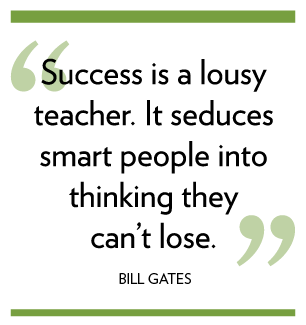I really believe that, to create true business or life success, you need to be brave enough to fail. While I know this likely contradicts everything you believe or think you know, I have arrived at this conclusion through both my own entrepreneurial experiences and those that I have observed alongside my clients. By blindly striving for what you perceive to be “success” rather than acknowledging your missteps and taking the opportunity to learn from them, you will ultimately impede your ability to achieve the greatest business victories.
It is as Bill Gates once stated: “Success is a lousy teacher. It seduces smart people into thinking they can’t lose.”
Truth be told, we remember our challenges much more clearly then we remember the paths we took to reach success. Successful people, upon recognizing a mistake, stop and identify the need, opportunity, or pivot necessary to correct that mistake. They own it.
Frankly, I think that we as Canadians – even moreso than others – are philosophically afraid of any kind of perceived “failure.” Perhaps we need to adopt more of our southern neighbours’ business gusto. To do so, you just need to look at our nest Canadian success stories and see where the leaders involved lagged, pivoted, and owned their market category.
 The fact is, if we never make missteps, we are succeeding only modestly. Look: if you want to get better, you must push yourself. You must be intuitive enough to recognize that if you are never failing, you’re simply not pushing hard enough. Missteps, failings, or whichever other terms you nd more palatable are part of getting better. A good leader understands this and encourages his or her team to creatively accelerate its successes by achieving what I call “open-minded failures.”
The fact is, if we never make missteps, we are succeeding only modestly. Look: if you want to get better, you must push yourself. You must be intuitive enough to recognize that if you are never failing, you’re simply not pushing hard enough. Missteps, failings, or whichever other terms you nd more palatable are part of getting better. A good leader understands this and encourages his or her team to creatively accelerate its successes by achieving what I call “open-minded failures.”
This is how we learn.
Correcting and capitalizing on a big missed opportunity leads to true success. By worshiping conceptual success, we create a culture that celebrates the status quo. To truly succeed in building strong individuals, companies, communities, and regions, we must not fear failure. The trick lies in not making the same mistake(s) twice.
Just listen to Facebook CEO Mark Zuckerberg: “Basically, any mistake that you think you can make,” he says, “I’ve probably made or will make in the next few years.”
In the business world, several core principles stay the same, but many speci c strategies change signi cantly over time. While I understand that success has many de nitions, for most businesses it still entails providing value, creating strong customer engagement, and generating a positive bottom line. What has and will continue to change, though, is the speed with which the world is churning. The strategies of past successes simply will not continue to chart the best course for the future. And the only way you, as the leader of your team, can set positive new courses and implement successful new strategies is to expand your collective ability to push the envelope.
Experiment. Learn. Fail. Create. Succeed.
Napoleon Hill, author of the instructional book Think and Grow Rich, echoes these sentiments: “Your shortest route to success is failure,” he writes. “Every adversity, every failure, every heartache carries with it the seed of an equal or greater bene t.”
As for me, I continue to learn.
Karen Behune Plunkett is Principal at PinPoint Strategic Direction, an advisory and strategic consulting firm, encouraging entrepreneurs, businesses and organizations to effectively identify goals and priorities. www.pinpointsd.com




